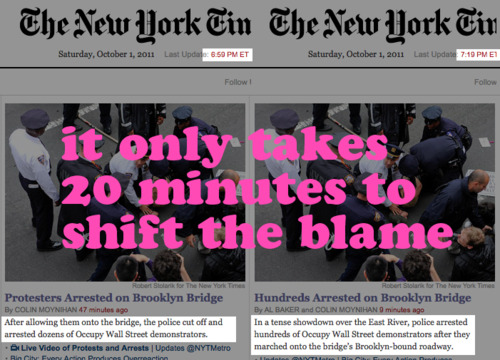Spot the differences: New York Times on Russia and Occupy
When 5,000 liberals protest in Moscow, it’s front page news; but when 15,000 radicals rally in New York, they simply pretend it never happened.
“Propaganda is to democracy what the bludgeon is to a totalitarian state.”
~ Noam Chomsky, Manufacturing Consent (1988)Consider this rather dramatic contrast: when 300 liberals are arrested during an anti-Putin protest in faraway Moscow, the New York Times splashes the news onto its front page. But when 700 radicals are arrested in an anti-Wall Street rally in New York itself, the Times virtually ignores them, pushing the news onto its obscure ‘City Room Blog’ (which, by the way, is excellent).
The difference in framing between these two items is particularly remarkable. First of all, there’s the title: “Moscow Moves to Quell Second Day of Anti-Putin Protests.” Compare the laden term “to quell”, which implies an authoritarian type of crackdown, with the following matter-of-fact statement: “Police Arrest More Than 700 Protesters on Brooklyn Bridge.”
Then compare the introductory paragraphs of the two articles: “Russian authorities acted decisively to quash a second day of anti-government protests,” versus “In a tense showdown above the East River, the police arrested more than 700 demonstrators from the Occupy Wall Street protests who took to the roadway as they tried to cross the Brooklyn Bridge.”
It’s clear that in the report on Russia, the authorities receive the blame, while the report on New York is much more ambiguous and seems to imply that the Occupy Wall Street protesters actually brought the arrests upon themselves by taking the roadway. What is worse, the Times actually changed its story afterwards to provide a more favorable representation of the NYPD:
Now consider the second paragraph, which in the case of the New York arrests was liberally donated to authorities, giving an NYPD spokesman the opportunity to legitimize the arrests before they had even been criticized:
The police said it was the marchers’ choice that led to the enforcement action.
“Protesters who used the Brooklyn Bridge walkway were not arrested,” Paul J. Browne, the chief spokesman for the New York Police Department, said. “Those who took over the Brooklyn-bound roadway, and impeded vehicle traffic, were arrested.”
Compare that to the Russian protests, where the second paragraph is dedicated entirely to a contextualization of the protesters’ grievances and where the police response is implicitly denounced for “suffocating” a peaceful crowd:
Several hundred opposition protesters convened in a central square, hoping to maintain the momentum created on Monday, when as many as 5,000 protested over reports of alleged fraud in parliamentary elections. The crowd that formed Tuesday, however, was rapidly choked off by lines of riot police, who dragged many protesters onto buses.
This is exactly the type of media propaganda that Noam Chomsky, the MIT linguist, denounced in his highly influential book Manufacturing Consent. “Any dictator,” as put it, “would admire the uniformity and obedience of the U.S. media.” Sadly enough, that dystopian vision remains all too relevant today.
DANCING NEBULA

When the gods dance...
Monday, December 12, 2011
Spot the differences: New York Times on Russia and Occupy
via roarmag.org
Subscribe to:
Post Comments (Atom)


No comments:
Post a Comment